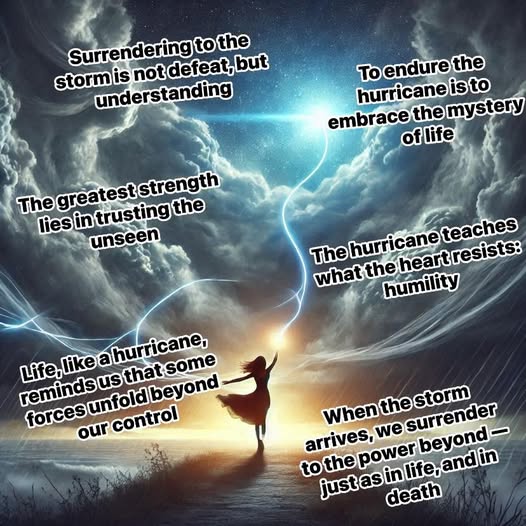
Come closer, and listen to this tale of storms, fate, and the unseen currents that guide us all. It is a story of surrender, of forces far beyond our control, and of the pride that often holds us back from yielding to them.
In a quiet village by the sea, there lived a young woman named Maya. She loved the ocean — its shimmering surface by day, its whispering waves by night. The sea was a constant companion, a source of comfort and livelihood for all who lived in the village. The villagers trusted it, believed they understood its moods, its ebbs and flows.
But one autumn afternoon, everything changed. The sky, which had been a clear stretch of blue, began to darken. A stillness took over the air, so deep that even the birds stopped their songs. And then the message came: the meteorological department had forecast a hurricane. A storm unlike any they had seen in decades was on its way.
Panic swept through the village. The elders spoke of past hurricanes, of homes shattered and lives lost. Maya, who had always trusted the ocean, now felt betrayed. She had always believed that if she respected the sea, it would respect her in return. But this storm — it was indifferent to her wishes, beyond anyone’s control. The winds were coming, and no plea or preparation could stop them.
The villagers gathered their belongings, boarding up homes, seeking shelter inland. Yet Maya’s heart weighed heavy with fear. “Why must we suffer like this?” she asked her father, an old fisherman who had seen many storms in his lifetime.
Her father looked out to the swelling waves, his eyes steady. “Maya,” he said, “there are powers greater than us — the sea, the wind, life itself. We cannot control what comes. All we can do is meet the storm, endure it, and trust that the world will keep turning.”
The hurricane came with a fury that shook the earth. Winds roared like wild beasts, waves crashed against the land, and for a time, the world felt lost to chaos. The village, though prepared, could only hold on and wait. They had no say in the matter; the storm would run its course as nature had decreed.
As Maya huddled with her family, she felt a war within her heart — a clash between fear and pride. A part of her wanted to fight back, to deny the storm’s power, to refuse to accept that something greater was in control. So often, she realized, our ego resists surrendering to forces beyond our reach. We cling to the illusion of control, unwilling to bow to anything greater. But sometimes, the only path to peace is to let go, to submit to the truth that not everything is ours to command.
And then, as suddenly as it arrived, the hurricane passed. The wind softened, the rain grew gentle, and the first rays of sunlight broke through the clouds. The villagers emerged, eyes wide with relief and awe. There was damage, yes, but there was also life — stubborn, enduring, ready to rebuild.
Maya stood on the shore, looking at the calm sea. She realized something then: life itself is like that hurricane. There are moments when we are swept away by forces we cannot control, especially at the end of our journey. Death, like the storm, comes not as a punishment or a betrayal, but as a part of existence — a force that we must meet, trusting that beyond it, the story continues.
Her father’s words echoed in her heart: We cannot control what comes. But we can endure, we can trust, and we can keep moving forward.
And so, with that understanding, Maya and the villagers rebuilt their lives, their hearts a little wiser, their spirits a little stronger. They knew now that though some storms cannot be stopped, life itself is resilient — and sometimes, letting go of pride and yielding to greater forces is not a defeat but a path to a new beginning.
And just as the sun rises after the storm, so too does life go on, even beyond the boundaries we can see.

